NHTSA Poised for Potential Deregulation Bonanza on Automotive Safety Aids

We knew the Trump administration wanted to deregulate the automotive industry in order to free it from any production hangups, be it imagined or genuine. However, some of the items under consideration for potential elimination are safety features that seem silly to go without. At the top of that list is the requirement that all electrically driven vehicles must emit noise to alert pedestrians to their presence.
However, this isn’t the only safety feature at risk of becoming an optional extra. In budget documents provided to Congress, the National Highway Traffic Safety Administration specified it is considering six separate areas for deregulation. Those include the modern standard for rear-view mirrors and backup cameras in passenger cars, mandatory electronic stability-control units for heavy trucks, and a rule allowing car dealers to install switches to deactivate airbags in customer vehicles.
While some of the rules could be abolished entirely, others are more likely to undergo some gentle retooling to provide automakers greater flexibility. Automakers have long pressed for the revamp of some antiquated, NHTSA-administered safety standards in order to permit the introduction of newer technologies. Still, eliminating any safety mandate is likely to raise the ire of consumer safety advocates, whether the end goal is well-intentioned or not.
Considering agencies throughout the federal government view expansive deregulation as a central tenant of President Trump’s plan to abolish roadblocks to corporate productivity, safety groups may have plenty to gripe about — especially if the new-and-improved safety technologies automakers are promising don’t immediately arrive.
As usual, nothing is ever as one-dimensional as any singular group would like it to be.
“This looks like to me that the agency was trying to figure out what things they didn’t really need and what things really aggravated the manufacturers,” Joan Claybrook, former NHTSA administrator under President Jimmy Carter and president of Public Citizen, told Bloomberg. “But I do think the agency does have the obligation to explain these things when they take effect.”
So far, the NHTSA hasn’t specified which of the regulatory issues it wants to abolish or reshape — only that it was reassessing their validity.
It would certainly be somewhat hypocritical for the agency to outright eliminate the majority, though. The NHTSA’s own research estimates the electronic stability control mandate for trucks would prevent around 1,420 to 1,760 crashes and 40 to 49 deaths annually. “It’s bad policy to take off the books policies that are effective now and saving lives,” said Henry Jasny, senior vice president of Advocates for Highway and Auto Safety.
Likewise, the EV noise requirement was estimated to prevent some 2,400 pedestrian injuries per year once electric vehicles became ubiquitous.
The U.S. Transportation Department has already finalized rules requiring electric vehicles and hybrids to emit “alert sounds” at speeds below 18.6 miles per hour, warning cyclists, pedestrians, and the blind of the approaching danger. It did so just last December. While the rules were set to take effect last February, the Trump administration delayed the date until September at the request of various automakers.
“[The] NHTSA is working with the new administration on its regulatory portfolio and priorities, including pending petitions for reconsideration,” the agency said in its official statement.

A staunch consumer advocate tracking industry trends and regulation. Before joining TTAC, Matt spent a decade working for marketing and research firms based in NYC. Clients included several of the world’s largest automakers, global tire brands, and aftermarket part suppliers. Dissatisfied with the corporate world and resentful of having to wear suits everyday, he pivoted to writing about cars. Since then, that man has become an ardent supporter of the right-to-repair movement, been interviewed on the auto industry by national radio broadcasts, driven more rental cars than anyone ever should, participated in amateur rallying events, and received the requisite minimum training as sanctioned by the SCCA. Handy with a wrench, Matt grew up surrounded by Detroit auto workers and managed to get a pizza delivery job before he was legally eligible. He later found himself driving box trucks through Manhattan, guaranteeing future sympathy for actual truckers. He continues to conduct research pertaining to the automotive sector as an independent contractor and has since moved back to his native Michigan, closer to where the cars are born. A contrarian, Matt claims to prefer understeer — stating that front and all-wheel drive vehicles cater best to his driving style.
More by Matt Posky
Latest Car Reviews
Read moreLatest Product Reviews
Read moreRecent Comments
- ToolGuy The other day I attempted to check the engine oil in one of my old embarrassing vehicles and I guess the red shop towel I used wasn't genuine Snap-on (lots of counterfeits floating around) plus my driveway isn't completely level and long story short, the engine seized 3 minutes later.No more used cars for me, and nothing but dealer service from here on in (the journalists were right).
- Doughboy Wow, Merc knocks it out of the park with their naming convention… again. /s
- Doughboy I’ve seen car bras before, but never car beards. ZZ Top would be proud.
- Bkojote Allright, actual person who knows trucks here, the article gets it a bit wrong.First off, the Maverick is not at all comparable to a Tacoma just because they're both Hybrids. Or lemme be blunt, the butch-est non-hybrid Maverick Tremor is suitable for 2/10 difficulty trails, a Trailhunter is for about 5/10 or maybe 6/10, just about the upper end of any stock vehicle you're buying from the factory. Aside from a Sasquatch Bronco or Rubicon Jeep Wrangler you're looking at something you're towing back if you want more capability (or perhaps something you /wish/ you were towing back.)Now, where the real world difference should play out is on the trail, where a lot of low speed crawling usually saps efficiency, especially when loaded to the gills. Real world MPG from a 4Runner is about 12-13mpg, So if this loaded-with-overlander-catalog Trailhunter is still pulling in the 20's - or even 18-19, that's a massive improvement.
- Lou_BC "That’s expensive for a midsize pickup" All of the "offroad" midsize trucks fall in that 65k USD range. The ZR2 is probably the cheapest ( without Bison option).



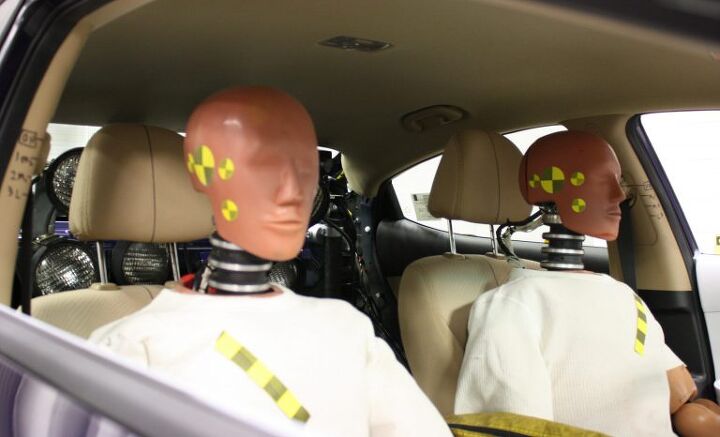

















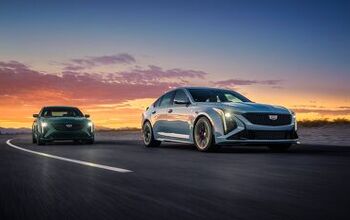

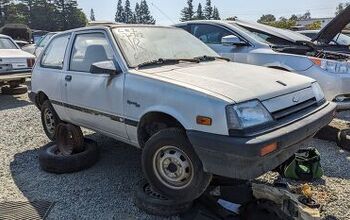


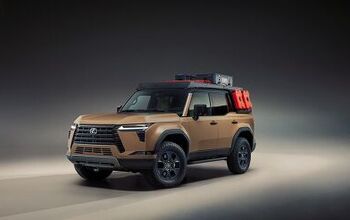
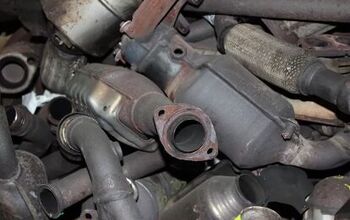






Comments
Join the conversation
"Those include the modern standard for rear-view mirrors" Fake news, you can't see out of the cars at all so what is a rear-view mirror going to do? Here are some real safety standards: 1. Drivers must be able to sufficiently see out of every window in their field of vision and all retractable windows must be of a minimum glass height/area. 2. Headlights cannot be brighter than X lumens on pain of felony. 3. Tires must be of a minimum thickness of three inches when sold. No exceptions. What else?
Sweet the personal responsibility bootstrappers are finally getting that much needed traction they've been talking about. Now if the administration would just make seat belts, ABS/TCS/ESC optional as well as crash absorbing structures they could get the sub 3000 pound full size brodozer they are looking for at a price point where they can finally afford it after the steel mill shut down. Trump mak'n 'murica great again!